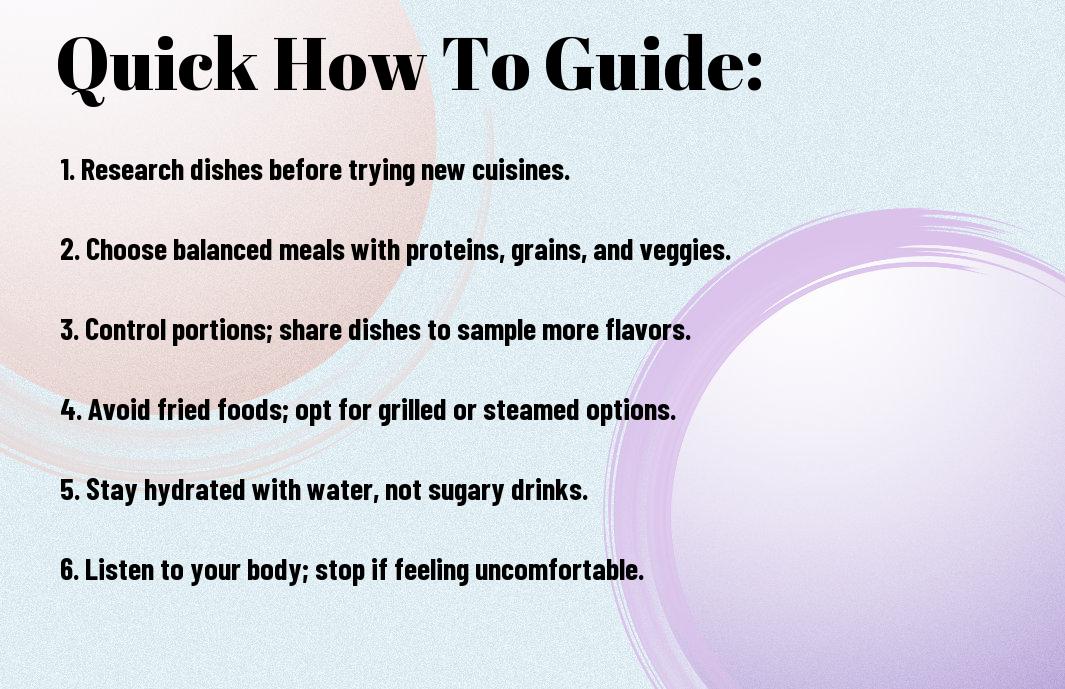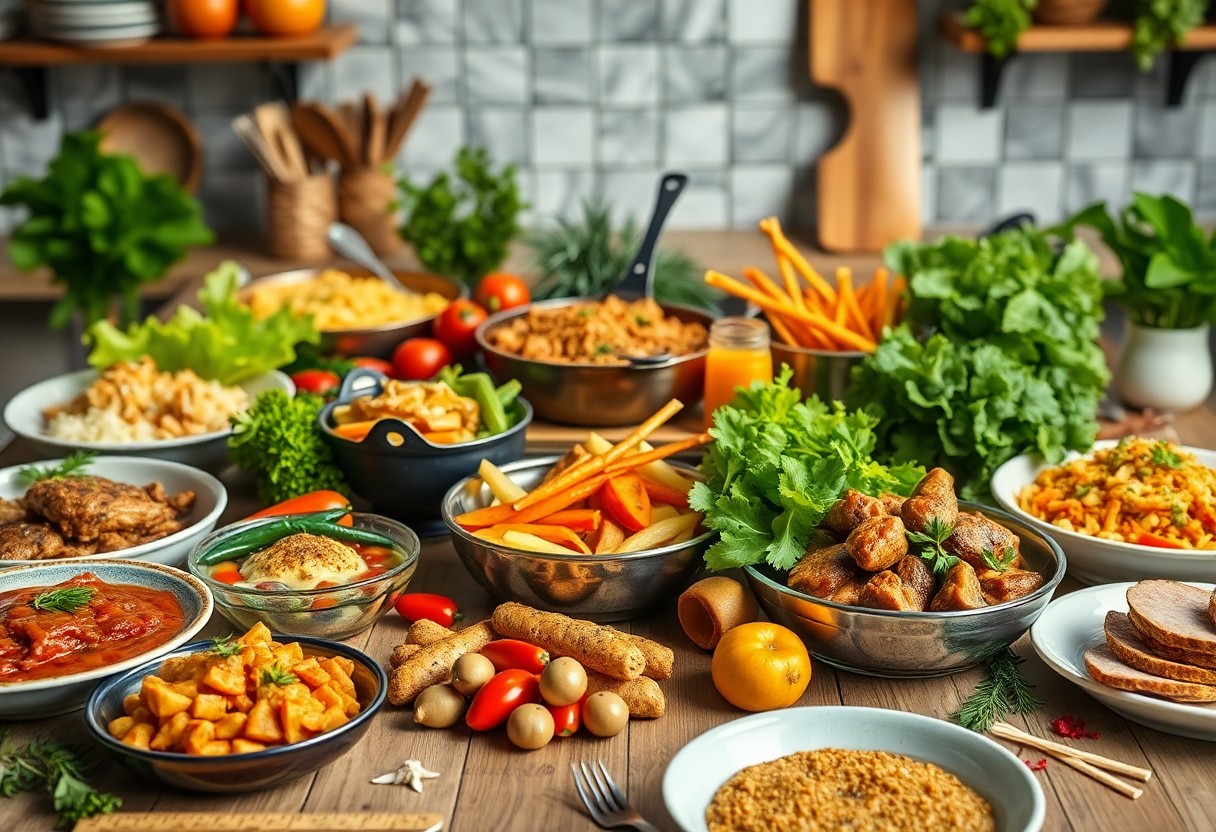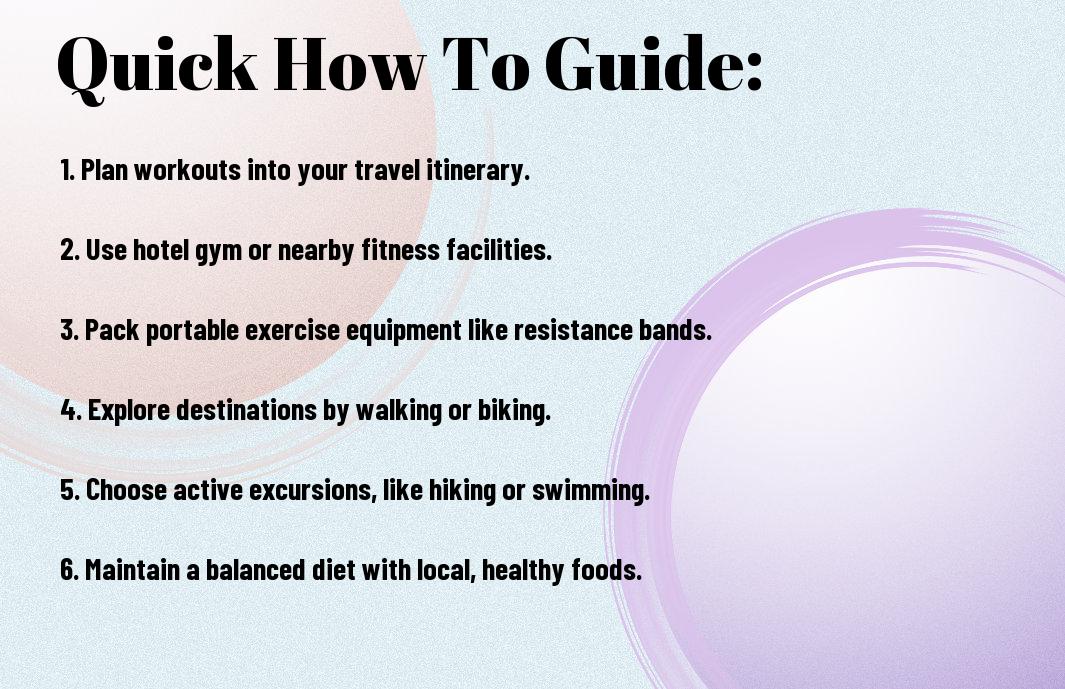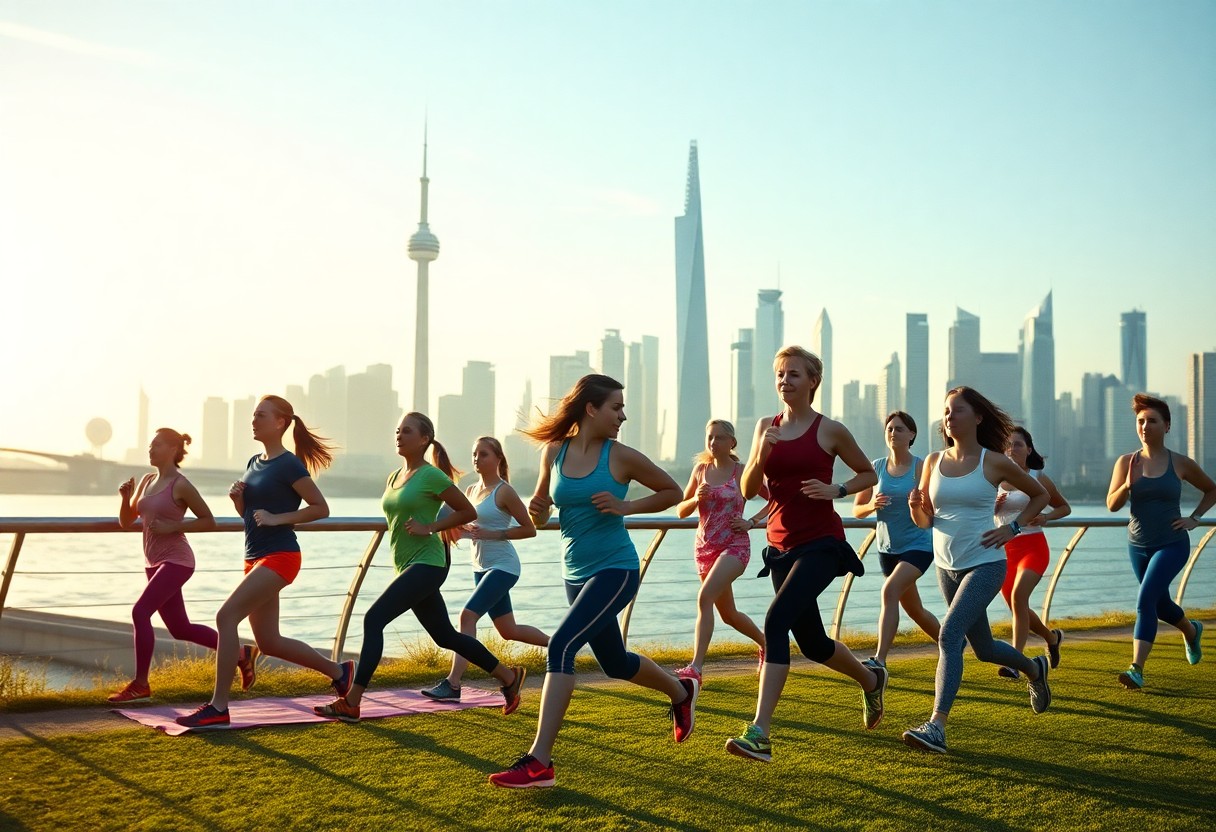Health should be a top priority when you travel abroad, as exploring new cultures and cuisines can sometimes challenge your well-being. To ensure you enjoy your adventures without compromising your physical condition, you need practical strategies to maintain a balanced lifestyle on the go. This guide will equip you with valuable tips and insights, enabling you to navigate your trip while staying energized and fit. Whether it’s managing your diet, staying active, or prioritizing self-care, here’s how you can keep your health in check while discovering the world.
Key Takeaways:
- Stay Hydrated: Always carry a water bottle and drink plenty of fluids, especially in hot climates, to avoid dehydration.
- Practice Good Hygiene: Wash your hands often and use hand sanitizer to minimize the risk of illness while exploring new places.
- Choose Safe Foods: Be selective about where you eat; opt for cooked foods and bottled drinks to reduce the chances of foodborne illnesses.
- Get Adequate Rest: Prioritize sleep and take breaks throughout your travels to keep your energy levels up and immune system strong.
- Exercise Regularly: Incorporate physical activities like walking or hiking into your itinerary to maintain fitness and boost your mood.
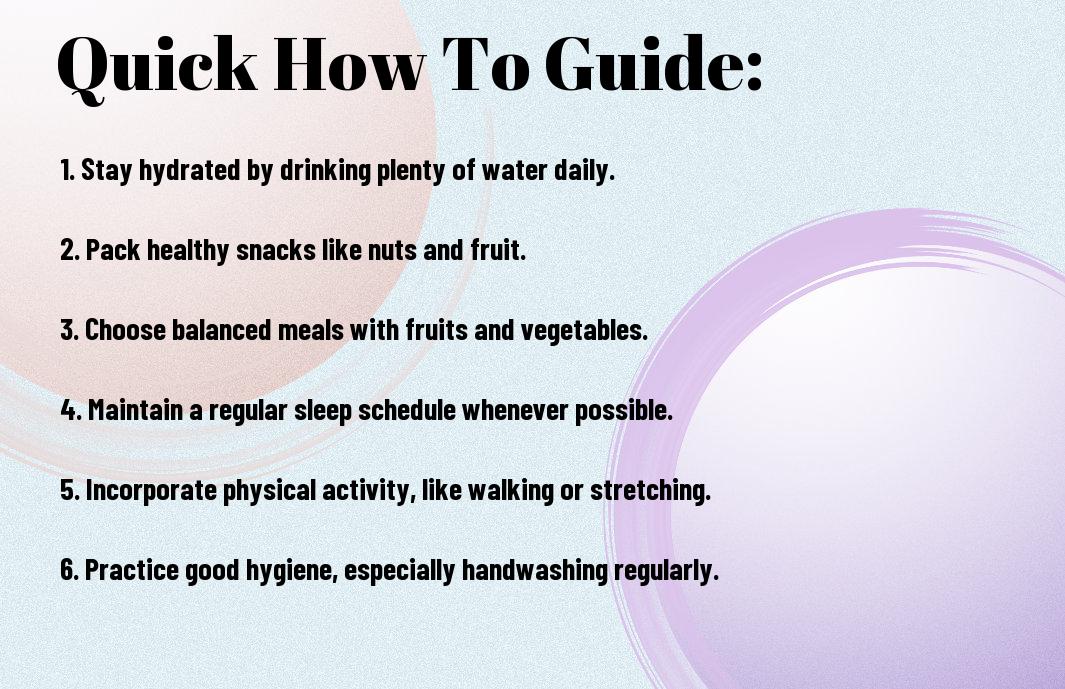
Preparing for Your Trip
A thorough preparation is key to maintaining your health while traveling abroad. Start by planning your itinerary, ensuring you allocate time for wellness activities like exercise, and considering your dietary options. Pack strategically, including health necessarys like medications and a basic first-aid kit. The more organized you are, the easier it will be to stay healthy during your adventures.
Researching Your Destination
The best way to stay healthy while traveling is to research your destination beforehand. Understand the local cuisine, climate, and common health concerns in that area. This knowledge enables you to make informed choices about where to eat and what activities to participate in while ensuring you’re prepared for any potential health issues.
Vaccinations and Health Precautions
While preparing for your trip, check with your healthcare provider about necessary vaccinations and health precautions for your destination. Certain countries may require required vaccines, such as those for hepatitis or typhoid, and taking preventive medications for illnesses like malaria could be advisable.
Plus, it’s a good idea to register with your government’s travel advisory service to get alerts about your destination. Make a list of the nearest hospitals and clinics, and ensure you have adequate travel insurance that covers health emergencies. Carry documentation of your vaccinations with you, and familiarize yourself with any cultural practices related to health and hygiene in the area you’re visiting. These simple steps can make a significant difference in your travel experience.
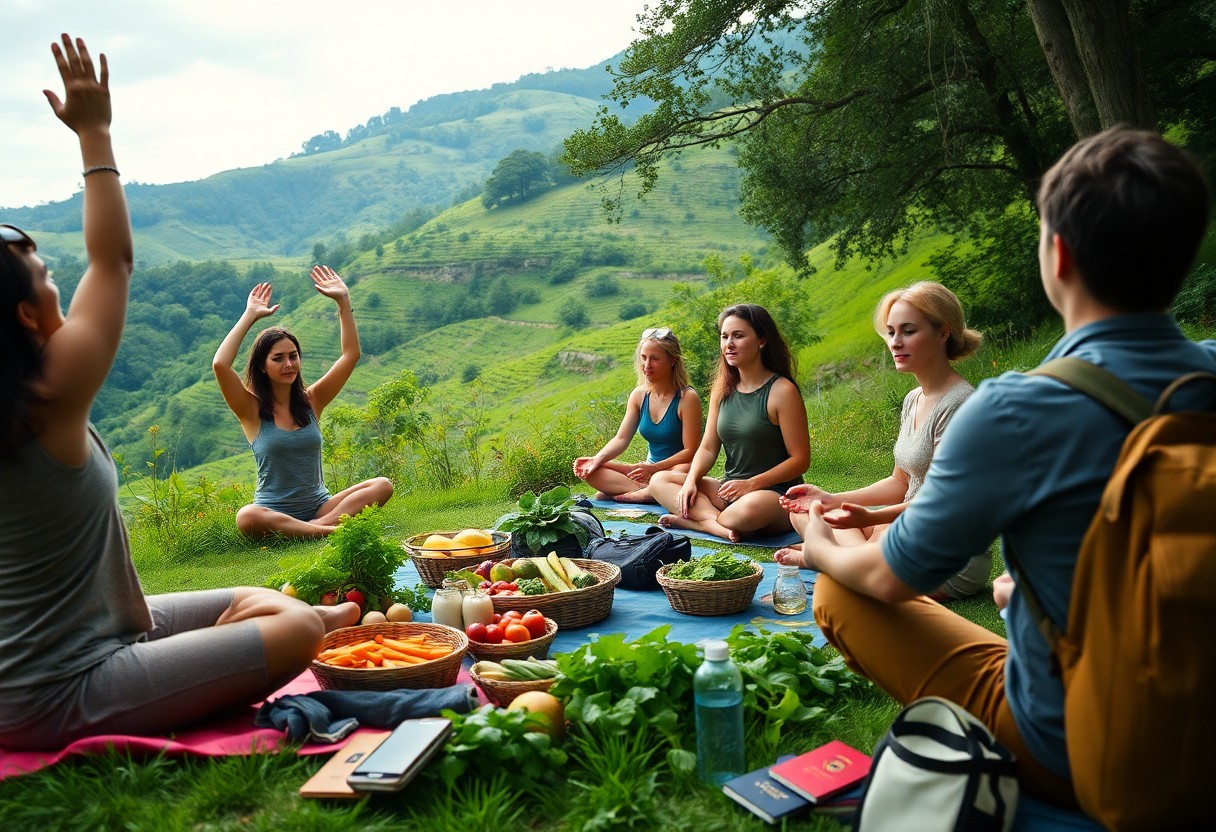
Packing Smart for Health
Some thoughtfulness in your packing can significantly contribute to your well-being while traveling. Prioritize items that support your health journey, making conscious choices that keep you feeling great no matter where you’re headed.
Essential Medications and First-Aid Kits
Kits are vital for addressing minor health issues that may arise while you travel. Always pack a basic first-aid kit containing band-aids, antiseptic wipes, and pain relievers, along with any personal medications you require. This preparation will help you tackle unexpected situations quickly.
Health-Conscious Packing Tips
Some packing strategies can enhance your travel experience while keeping your health in check. Be sure to include nutritious snacks, a reusable water bottle, and fitness gear. As you pack, consider these tips:
- Choose lightweight and quick-dry clothing.
- Pack healthy snacks like nuts and dried fruit.
- Include a travel-sized vital oils kit for relaxation.
After considering these elements, you can tailor your suitcase to support a healthier lifestyle on the go.
A well-planned packing list can make a tremendous difference in maintaining your health while traveling. Include items that align with your healthy habits, ensuring you stay energized. Think about these additional tips:
- Opt for whole food options to avoid processed snacks.
- Bring a travel blender for smoothies if feasible.
- Incorporate exercise bands for easy workouts wherever you are.
After you establish these routines, you’ll enjoy a more vibrant and healthy travel experience.
Staying Healthy During Travel
Unlike staying at home, traveling abroad can expose you to new health risks and dietary changes. To ensure a healthy experience, you can check out Preparing for a healthy trip: What to know before you travel, which offers valuable insights on pre-travel preparations. Maintaining your health while exploring a new destination is key to enjoying your adventure fully.
Tips for a Balanced Diet
Balanced meals on the go can be challenging but are important for your well-being. Here are some tips to maintain a nutritious diet while traveling:
- Pack healthy snacks like nuts and fruit for your journey.
- Opt for local healthier food options when dining out.
- Try to include a variety of food groups in your meals.
The right nutrition helps keep your energy levels high during your travels.
Staying Hydrated and Active
Healthy hydration and regular activity are vital while traveling. You should aim to drink plenty of water and stay active through walking, hiking, or other recreational activities.
Hydrated bodies function more effectively, improving your overall travel experience. Aim to drink water frequently, especially in warm climates or during long flights. Incorporate movement throughout your day by exploring cities on foot or engaging in sightseeing excursions that require physical activity. Prioritizing hydration and exercise not only enhances your health but also allows you to fully enjoy the cultural experiences your destination offers.
Navigating Health Risks Abroad
Not all destinations have the same health standards or amenities as you might be accustomed to at home. Before you travel, it’s necessary to understand the potential health risks you may encounter in different countries. Research the local healthcare system, vaccination requirements, and any prevalent illnesses to ensure that you are adequately prepared for your journey.
Understanding Local Health Conditions
Some regions may have specific health concerns, such as infectious diseases, air quality issues, or food safety problems. Familiarize yourself with these local health conditions to assess any risks you might face while exploring. Additionally, consider seeking advice from travel health professionals who can provide tailored recommendations based on your destination.
Emergency Contacts and Resources
If you encounter a health issue while abroad, knowing how to access medical care quickly is necessary. Compile a list of local emergency numbers, medical facilities, and your country’s embassy or consulate information before you go. This preparation allows you to act swiftly in case of an emergency, ensuring that you receive the necessary care without unnecessary delays.
With access to reliable emergency contacts you can navigate any health issue with ease. Research the nearest hospitals or clinics at your destination and consider downloading health apps that offer medical assistance or connect you with local healthcare providers. Also, having your travel insurance details handy, including a 24-hour hotline, gives you peace of mind should the unexpected occur. Equip yourself with this information so you can enjoy your trip without worrying about potential health concerns.
Travel Insurance and Health Coverage
For a worry-free journey, it’s necessary to invest in travel insurance that provides adequate health coverage. This safeguard not only protects you from unforeseen medical expenses but also offers peace of mind, allowing you to focus on enjoying your travels. Make sure to read the policy details carefully to understand the extent of the coverage, especially when traveling to countries with high medical costs.
Choosing the Right Policy
An effective travel insurance policy should align with your specific needs and travel plans. Look for options that cover emergency medical expenses, evacuation, and any pre-existing conditions if applicable. Be mindful of the provider’s reputation and customer service, as these can impact your experience during a crisis.
What to Cover
With travel insurance, it’s important to ensure that your policy covers necessary areas such as medical emergencies, trip cancellations, lost baggage, and personal liability. Each of these aspects can significantly affect your trip and finances if something goes wrong.
Health-related coverage is vital to protect yourself from unexpected medical incidents. Look for policies that cover hospital visits, prescription medications, and emergency evacuations, especially if you’re traveling to remote locations. Additionally, confirm that any activities you plan on participating in, such as skiing or scuba diving, are included in your coverage. Comprehensive protection can make all the difference for a safe and enjoyable travel experience.
Cultural Considerations for Health
Your health can be significantly impacted by the local customs and practices of the areas you visit. Understanding cultural norms regarding health and wellness can help you avoid misunderstandings and respect local traditions. Engaging with locals and being open to their ways of living will not only enhance your experience but also keep you healthier on your travels. Be sure to inquire about local health resources, practices, and any specific customs related to well-being.
Adapting to Local Customs
Customs can vary widely across different cultures, particularly in relation to health practices. You should take the time to learn about these practices, whether it’s greetings, body language, or personal space, as they can influence social interactions and your overall experience. For example, in some cultures, physical touch is common, while in others, it may be considered intrusive. Observing and adapting to these customs will help you navigate social situations more comfortably and maintain your health and well-being while abroad.
Understanding Food Safety Practices
With the variety of cuisines available while traveling, understanding food safety practices is paramount to avoiding foodborne illnesses. It’s crucial to be aware of how food is prepared, washed, and stored in different cultures to safeguard your health. Pay attention to local food safety guidelines and choose establishments that prioritize cleanliness. Opt for freshly cooked meals and avoid street food in areas where hygiene seems questionable. Additionally, drinking bottled or purified water can prevent potential health issues related to contaminated water sources.
This understanding of food safety practices can significantly enhance your travel experience. Prioritize eating in places that are busy and have good reviews, as this often indicates quality and freshness. Being cautious and thus more informed about what you consume will not only improve your overall health but also allow you to enjoy local flavors without the fear of illness. You will find that adapting to food practices in different cultures can be a rewarding part of your trip, enriching your culinary experiences while keeping you safe.
Final Words
Upon reflecting on how to stay healthy while traveling abroad, it’s crucial to prioritize your well-being with a few key strategies. Maintain hydration, practice good hygiene, and eat balanced meals to support your immune system. Stay active by planning engaging outdoor activities and incorporating exercise into your itinerary. Be mindful of local health advisories and ensure you have necessary vaccinations. By implementing these practices, you can enhance your travel experience and return home feeling revitalized and healthy.
Q: What are some imperative tips for maintaining a balanced diet while traveling abroad?
A: To maintain a balanced diet while traveling, prioritize fresh fruits and vegetables, whole grains, and lean proteins. Look for local markets to purchase fresh produce, and choose restaurants that offer healthy options. When dining out, try to fill half your plate with vegetables, and limit fried and processed foods. Additionally, stay hydrated by drinking plenty of water and avoid excessive consumption of sugary drinks. Planning ahead, such as packing healthy snacks for long journeys, can also help you stay on track with your nutritional goals.
Q: How can I stay active while traveling, especially in cities with limited outdoor spaces?
A: Staying active while traveling in urban environments can be achieved through various creative methods. Use walking or cycling tours to explore the local area, which not only provides exercise but also allows you to enjoy the sights. If you have access to a hotel gym, take advantage of it for workouts. Alternatively, consider utilizing free fitness apps or online workout videos that require no equipment and can be done in your hotel room. Activities like yoga, aerobics, or body-weight exercises can easily fit into your travel schedule and help keep you energized.
Q: What precautions should I take to avoid illness while traveling internationally?
A: To reduce the risk of illness while traveling abroad, it is wise to stay updated on local health advisories and vaccinations. Packing a travel health kit with basic medications and first-aid supplies can be beneficial. Always practice good hygiene by washing your hands frequently and using hand sanitizer, especially before eating. Be mindful of the food and water you consume; opt for bottled water or filtered options and eat at reputable establishments. Additionally, be cautious of street food that may not have the same health standards as restaurants. By being proactive about your health, you can enjoy a more comfortable travel experience.
